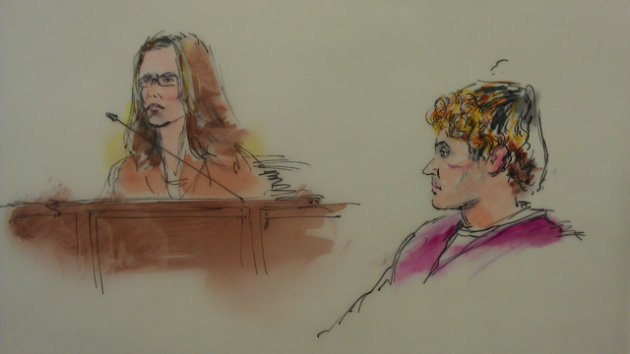 Courtroom sketch of Dr. Lynne Fenton and shooting suspect James Holmes (Bill Robles)
Courtroom sketch of Dr. Lynne Fenton and shooting suspect James Holmes (Bill Robles)
CENTENNIAL, Colo. -- James Holmes' defense team said their client might have tried calling his university psychiatrist minutes before shooting erupted in an Aurora, Colo., movie theater on July 20.
During testimony, defense attorney Tamara Brady asked Dr. Lynne Fenton if she recognized a university hospital operator's number that appeared on a redacted treatment file for Holmes.
"Did James Holmes call that number nine minutes before the shooting started?" Brady asked.
"I don't know," Fenton responded. It's unclear if Holmes specifically tried to reach the psychiatrist and, if so, why.
Her testimony dominated the nearly four-hour hearing on Thursday in which Judge William Sylvester tried to determine the nature of Fenton's professional relationship with Holmes, whether a notebook Holmes sent to Fenton is privileged information and when Holmes' treatment ended. Fenton also testified she contacted a university police officer on June 11 about Holmes. She said she was concerned and was trying to gather more information.
The defense scored a bevy of victories -- at least temporarily -- on Thursday, winning arguments that Fenton is a psychotherapist and that their professional relationship possibly continued to the date of the attacks. Holmes, still with orange-red hair and a maroon jail jumpsuit, seemed more active and observant than past court appearances. He particularly took notice when the psychiatrist entered the courtroom the first time.
Fenton, who coordinates a team of clinicians that offers mental health assistance to university students, testified that she severed her relationship with Holmes on June 11 -- the last day she saw him before the massacre that claimed 12 lives and wounded 58 movie-goers.
"On July 19, did you have an active doctor-patient relationship with James Holmes?" prosecuting attorney Karen Pearson asked Fenton.
"I believe I did not," Fenton replied.
But Sylvester cautioned attorneys that there might be a difference between when Fenton thinks she terminated the relationship and when the law says it ended.
"I need further evidence," the judge told attorneys, finding for the defense. "Once the relationship is established, it is incumbent that the evidence show it terminated."
Lawyers mostly asked Fenton about the timing of their relationship, how she terminates patient relationships and how she informed campus authorities about Holmes. Prosecutors repeatedly attempted to gain insight into Holmes's treatment. But the defense, led by Brady, objected on numerous occasions, saying the prosecution sought protected information.
Despite the judge's findings, the privilege issue isn't over. On Sept. 20, the court will continue hearings on whether the notebook is covered under doctor-patient laws. That hearing will feature testimony from three more prosecution witnesses and a defense witness.
Among the defense wins Thursday:
* Judge William Sylvester said Fenton's role in Holmes' treatment is more akin to a psychotherapist--which the defense has argued for weeks--than a medical doctor, which the district attorney's office maintained. Information Holmes shared with Fenton is, thus, more protected.
* Absent new testimony or evidence, Sylvester hinted he's inclined to rule that Holmes' treatment with Fenton continued beyond June 11, the last date Fenton saw Holmes, and possibly up until July 19, the day before the shootings. That's key to Holmes' defense because the longer his doctor-patient relationship with Fenton persisted, the longer the defense can invoke privilege.
* Sylvester quashed the prosecution's attempts to delve more into the notebook Holmes mailed to Fenton on July 19, the night before the attacks. The DA's office argued unsuccessfully that observations by an Aurora Police detective were instrumental in answering whether the notebook is privileged information. Holmes' defense team repeatedly objected to the prosecution's tactics.
Three other prosecution witnesses--all law enforcement--testified on Thursday. Greg McGahey, a postal service agent who investigates postal crime, said that evidence suggests Holmes mailed the notebook to Fenton on July 19. Alton Reed, an Aurora Police detective, later testified about seeing the package that contained the notebook through a camera on a bomb robot. Another witness, Steve Beggs, an ATF agent, had his testimony cut short after the defense successfully argued that his testimony was not relevant to the issue of privilege.
Holmes faces 142 counts from the shooting at the midnight premiere of the new Batman movie in Aurora, a Denver suburb.
bonobos charles manson actuary elon musk al sharpton fox mole manson
No comments:
Post a Comment
Note: Only a member of this blog may post a comment.